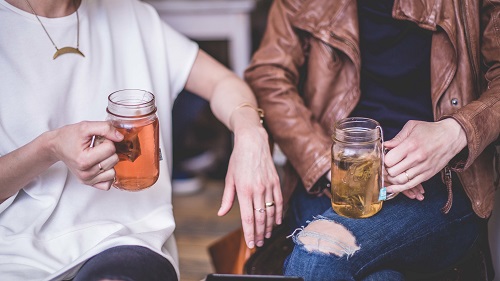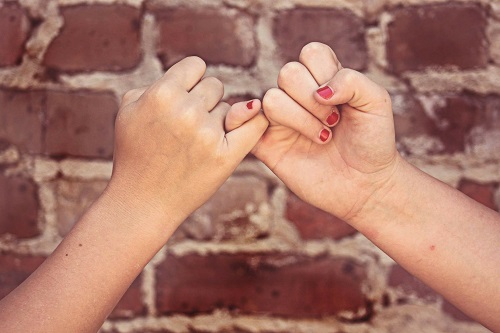
How to make new friends when you have a disability


I was diagnosed with depression when I was 9, after multiple family members (and a few other significant people in my life) died in less than 3 years. It took a while, but I came through both things with my hope for the future and my belief in myself intact!
Since then, I have lived through many other very challenging situations, and have consistently emerged on the other side with a renewed sense of purpose. I try to focus on the positives in my life, and keep my day-to-day stresses as low as possible with strategic planning and cultivating a mindset of abundance and gratitude.
I have loving family members with helpful social connections and enough income to be able to help me when I really needed it. Through these supports, I have been able to focus on making my life better, rather than needing to put all my energy into survival. I want to help others do the same. I want to help you (and others) who are dealing with physical, emotional, or mental health challenges to handle life’s challenges.
Challenges to connecting with others when you have a visible disability


There’s a lot of judgment and bad assumptions made when a disabled person is first met, and I am immediately identified as ‘other’. In those moments, it is hard to picture building friendships with the people who are judging me.
The key here is that you don’t have to.
When there is a physical difference, people are going to notice, that is unavoidable. But you can get an idea about who you can connect with by correcting the assumptions and/or finding people who don’t make them in the first place!
You also can focus on finding people who share other traits or interests with you and building on those connections.
The other big challenge is accessibility, whatever your condition is. For example, if you use a wheelchair, things need to be wheelchair accessible. If you are deaf, you need to be able to get the information you need visually. If you are blind, you need to get the information or connections without visual cues.
There are tools you can bring along to help the process, but in some ways, you need people who care enough about what you think and how you feel to respect the need for those accommodations.
It’s possible that that won’t happen at first. But, I believe it is within your ability to persevere (either with multiple groups of people or multiple visits) until they do!
Your need for accommodations may adjust what events you can attend or participate in and will push you towards certain types of opportunities. But there still are options out there.
Challenges with an invisible condition
When managing something that’s not obvious (like my disability is much of the time), people tend to assume you are able-bodied. This makes the initial contact pretty easy. But that’s often followed by a sense of betrayal or othering when your condition becomes apparent. The risk of rejection often comes a bit later than it does with a physically visible disability, but it’s definitely still there.
When your condition is invisible, people are less apt to understand why your behaviours don’t line up with their expectations.
With social anxiety or other mental health conditions, your comfort in interacting with others can be lower. This means that the first couple of times you participate in something, you are almost certainly guaranteed to feel uneasy. This can be frustrating, but it can be manageable.
If you’re dealing with a more physical but invisible condition, such as diabetes or Crohn’s disease, you probably need to be more thoughtful about certain choices, such as what you eat or where access to toilets is. But you can plan ahead to help make them less impactful on you, or less noticeable to others.
Either way, the risk of rejection is a bit higher for those of us managing disabling conditions – and going out often requires more energy and planning than the average person as well.
However, there are things you can do to combat all of this and find new people to connect with.
Joining existing groups
What I have found incredibly helpful has been joining longstanding social or support groups.


I am an active participant in Birequest, and have been for close to 15 years. As a bisexual person, this is a group that shares my identity, giving me an instant ‘in’, which helps reduce the ‘othering’ effect of my symptoms.
With any group, there are always new members joining, so there are more potential friends at pretty much every meeting, and there is also a crowd of regulars who I can expect to see most times I show up!
As you participate, you start to become one of those regulars, and have a good chance of finding other regulars (and new folks) who you can connect with and grow a friendship.
But what kind of group should I join?
Think about things you enjoy, and search for groups focused on those subjects or identities.
If you have an additional minority identity, there may be a support or discussion group around that topic. It’s about being creative! See if you can find anything that matches your interests, identity or even weaknesses.
- There are a lot of groups built around solving common problems, such as weight watchers, alcoholics anonymous, or discussion/support groups for people who are struggling financially.
- If there’s a bad habit you want to break or an identity you are exploring (or want to be proud of), maybe there’s a group nearby that you could start participating in regularly or at least try out.
- If you enjoy writing, look for a writer’s group in your area. If you are a big fan of a particular artist or genre, see if there’s anything out there with that focus.
- If you happen to be a religious person who finds joy in your church, synagogue, mosque or coven, look there for more social opportunities. Through this, you can share your religious celebrations with those who share your faith, making more friends and closer community ties.
- Maybe there’s a book club or bible study or ritual planning group that you could participate in, taking a more active part in the organization!
- Meetup has an amazing variety of groups, including adult colouring circles, meditation groups, and various networking activities – as well as hiking groups, foodie groups, and all kinds of other options!
Making sure you can attend
Once you find something that fits your identity or interests, look into it and make sure that you’ll physically be able to attend.
Many of these groups often have a co-ordinator listed (or at least a contact person), so you can reach out to them for advice or help because of your particular symptoms or concerns.
Think carefully about what you need before you get in contact. You may want to ask:
- about physical accessibility;
- how big the group typically is – should you expect 5 people? 25? 50?;
- the age range of members – will I fit in? Does the group skew younger than me or maybe older?;
- what to expect at the event – are people in chairs? Are you going to do much running? If I run late is it still okay for me to come in?
Once you find something that meets your basic needs, attend the group a few times to see how it feels. You often get the sense of a group’s culture from the first meeting, so the most important step is to show up and see what it’s like.
If one event or group feels uncomfortable, try another one until you feel like you’ve found people you could develop friendships with. If at all possible, keep going to one thing until or unless you find something better.
Doing things this way will give you opportunities to become familiar to the group and meet a variety of people who share an interest or identity with you. You are just about guaranteed to have a good time because you’re doing or discussing something you care about.


Advantages of going to a regular event
You always know when and where it’s happening, so you can plan for it. Once you figure out how to get there and back, you don’t need to figure it out again, unless you join a group that uses different venues every time, such as a foodie group.
If you don’t make it to a meeting, you aren’t letting the group down or being a big disappointment – the event is still going to happen whether or not you are there! I have found that really comforting as it removes a sense of responsibility for me. It keeps me from feeling guilty if I can’t make it – cancelling 1:1 plans means that the other person is disappointed.
If you go through a rough spell and can’t make it for a few days, weeks, or months, it’s something that you can look forward to returning to as soon as you are doing enough better.
As I mentioned before, I’ve participated in Birequest for close to 15 years now. The meetings were twice a month, and I’d have the occasional bad day, week, or month where I’ve missed it. I actually had to stop going for several years at one point! I kept in touch with a few friends from Birequest on and off but didn’t really return for close to five years.
The group was still there when I went back, and reintegrating was really easy. There were still regulars who knew me, as well as a lot of new folks. I quickly fell back into the swing of the group and felt very welcome immediately!
Once you’ve built those connections, you can develop friendships with individuals in the group who you build a good long-standing rapport with.
You don’t need to worry at the first or second meeting if you’ll ever see them again because you know that they’ll likely be at the next meeting or the one after that. This means you can let the friendship develop more naturally and you can build a deeper connection with somebody when you feel comfortable and ready to do so.
Developing and maintaining friendships
As you participate in your group, there will be people you feel drawn to, or who you find things in common with. See if you can make plans with them after a meeting, or before.


One of the first things you should do is be honest with the person about your situation. If you regularly are dealing with fatigue, let them know! If you go through depressive periods, give them a heads up! Tell them what you feel they need to know to be a better friend and to maintain the friendship.
For example, my movement symptoms are annoying and strange-looking, but they don’t cause me pain, and I’m totally aware when they happen. For me, a good friend will acknowledge my symptoms and then move on. If I stay symptomatic for prolonged periods of time, I may be approaching my ‘done’ point, and need to shift to a lower-stress/excitement activity or get ready to head out. They don’t need to actively do anything unless I ask them to.
There are also some days where I just am not up to communicating much. I need them to respect days when I’m feeling overwhelmed or have a migraine. And the other big thing for me is that my immune system is a bit out of whack, so notifying me if they are sick and potentially adjusting plans is greatly helpful.
Mainly, I am looking for respect and understanding, which are traits that are very important in cultivating a friendship anyway.
Making friends while managing a disabling condition
Any form of disability or disabling condition is going to interfere in some way with your social connections and therefore your friendships.
What you need to do for yourself is to find places where you can consistently meet people who share some identity or interest with you.
These spaces improve your chance of meeting people with something in common with you, increasing your chance of finding people who truly are worth being friends with.
More people than average will weed themselves out by simply not taking the opportunity to get to know you.
However, there are still people out there who you can develop close friendships with!
So, take care of yourself and keep looking for the right opportunities, and you’ll make or add to your collection of people who help you enjoy life!
By Alison Hayes
You can visit Alison’s blog, Thriving While Disabled, to read more posts, and join the DHorizons Tribe Facebook group to connect with and get support from other disabled people like you.
More on Disability Horizons…
- Disabled model Samanta Bullock on how to love your body
- From becoming disabled to interviewing disabled celebrities
- So you had a bad day? How to make the most of life with a disability